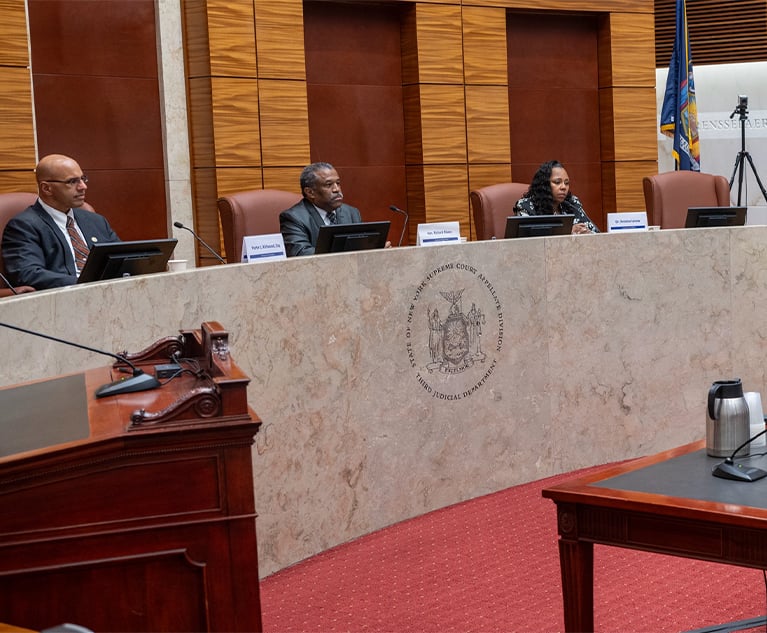'Like a Game of Jenga': Return of E-Filing Will Start Crowded Period for New York Courts, Lawyers Say
Attorneys said it will be important to pay close attention to judges' practices and rules, some of which have been amended due to the pandemic.
May 21, 2020 at 06:35 PM
4 minute read
 Photo: peshkova – Fotolia
Photo: peshkova – Fotolia
Memorial Day promises to be the start of an uncommonly busy week in the New York court system, attorneys agreed Thursday.
For the first time in more than two months, e-filing will be available for new cases not categorized as "essential" under a March 22 order from Chief Administrative Judge Lawrence Marks, which froze filing and sparked a prolonged disruption in the state's legal system as the coronavirus pandemic struck New York.
E-filing comes as a relief in New York City and the other downstate counties that have not yet met the state's metrics to begin reopening, attorneys in the city said. Nonessential filings have already begun in other parts of the state, where judges and court staff are also returning to courthouses, according to court officials.
"There's tremendous pent-up demand from cases that were put on hold," said Gregg Weiner, co-chair of the global litigation and enforcement practice group at Ropes & Gray.
While some cases have simply been sitting on desks, ready to file, since shortly after the nonessential filing freeze began, attorneys said many others will be related to issues that arose during the pandemic and resulting economic upheaval.
Real estate will be a particularly busy area in the coming weeks and months, litigators agreed, and industries hit hard in recent months, such as retail, will also have a high volume of new cases. But the economic effects of the pandemic have been felt widely, disrupting deals and throwing some corporate finance matters into disarray. All those issues could lead to new litigation, lawyers said.
E-filing of new cases is the latest of a series of measures easing the state courts back toward full function. Virtual conferences and motion filing for pending cases has been ongoing for weeks, but attorneys are still waiting for the return of in-person activities, including depositions and, eventually, jury trials.
"I think it's a significant step, but it doesn't restore us to the status quo pre-COVID, and you know there's additional delay and hurdles to deal with that you didn't have beforehand," Weiner said.
Lawyers will have to be cognizant of how the flood of new filings will affect judges, McDermott Will & Emery partner Andrew Kratenstein said.
Kratenstein said one state judge's clerk already told him that a case set for trial in December might be delayed as the courts try to catch up on two months' worth of missed appearances. "They may just be pushing everything back," Kratenstein said. "It may be like a game of Jenga, so they have to figure out where everything fits … everybody's just going to have to work together to get everything back on track, and that's going to take time."
He said it will be important for lawyers to pay close attention to judges' practices and rules, some of which have been amended due to the pandemic.
The new availability of e-filing will also help lawyers and clients in other areas.
Martha Cohen Stine, who practices family law as a founding partner of Cohen Rabin Stine Schumann and co-chairs the New York County Lawyers Association matrimonial law section, said it allows her to help her clients move forward.
In many cases, relationships have fallen apart while people are stuck under stay-at-home orders, Stine said, but clients who decided they were ready to go ahead and file for divorce haven't been able to do so.
Once they're able to file, Stine said, they'll get the benefit of automatic orders preventing the other spouse from taking certain actions, such as transferring assets out of joint accounts.
Filing for divorce also signals to the other spouse that circumstances are changing, Stine said, and that a judge may observe their behavior and set deadlines for next steps.
READ MORE:
Freeze in Most Civil Filings Brings Concern, Frustration for New York Litigators
This content has been archived. It is available through our partners, LexisNexis® and Bloomberg Law.
To view this content, please continue to their sites.
Not a Lexis Subscriber?
Subscribe Now
Not a Bloomberg Law Subscriber?
Subscribe Now
NOT FOR REPRINT
© 2025 ALM Global, LLC, All Rights Reserved. Request academic re-use from www.copyright.com. All other uses, submit a request to [email protected]. For more information visit Asset & Logo Licensing.
You Might Like
View All

Law Firms Expand Scope of Immigration Expertise Amid Blitz of Trump Orders
6 minute read
'Reluctant to Trust'?: NY Courts Continue to Grapple With Complexities of Jury Diversity
Trending Stories
- 1Uber Files RICO Suit Against Plaintiff-Side Firms Alleging Fraudulent Injury Claims
- 2The Law Firm Disrupted: Scrutinizing the Elephant More Than the Mouse
- 3Inherent Diminished Value Damages Unavailable to 3rd-Party Claimants, Court Says
- 4Pa. Defense Firm Sued by Client Over Ex-Eagles Player's $43.5M Med Mal Win
- 5Losses Mount at Morris Manning, but Departing Ex-Chair Stays Bullish About His Old Firm's Future
Who Got The Work
J. Brugh Lower of Gibbons has entered an appearance for industrial equipment supplier Devco Corporation in a pending trademark infringement lawsuit. The suit, accusing the defendant of selling knock-off Graco products, was filed Dec. 18 in New Jersey District Court by Rivkin Radler on behalf of Graco Inc. and Graco Minnesota. The case, assigned to U.S. District Judge Zahid N. Quraishi, is 3:24-cv-11294, Graco Inc. et al v. Devco Corporation.
Who Got The Work
Rebecca Maller-Stein and Kent A. Yalowitz of Arnold & Porter Kaye Scholer have entered their appearances for Hanaco Venture Capital and its executives, Lior Prosor and David Frankel, in a pending securities lawsuit. The action, filed on Dec. 24 in New York Southern District Court by Zell, Aron & Co. on behalf of Goldeneye Advisors, accuses the defendants of negligently and fraudulently managing the plaintiff's $1 million investment. The case, assigned to U.S. District Judge Vernon S. Broderick, is 1:24-cv-09918, Goldeneye Advisors, LLC v. Hanaco Venture Capital, Ltd. et al.
Who Got The Work
Attorneys from A&O Shearman has stepped in as defense counsel for Toronto-Dominion Bank and other defendants in a pending securities class action. The suit, filed Dec. 11 in New York Southern District Court by Bleichmar Fonti & Auld, accuses the defendants of concealing the bank's 'pervasive' deficiencies in regards to its compliance with the Bank Secrecy Act and the quality of its anti-money laundering controls. The case, assigned to U.S. District Judge Arun Subramanian, is 1:24-cv-09445, Gonzalez v. The Toronto-Dominion Bank et al.
Who Got The Work
Crown Castle International, a Pennsylvania company providing shared communications infrastructure, has turned to Luke D. Wolf of Gordon Rees Scully Mansukhani to fend off a pending breach-of-contract lawsuit. The court action, filed Nov. 25 in Michigan Eastern District Court by Hooper Hathaway PC on behalf of The Town Residences LLC, accuses Crown Castle of failing to transfer approximately $30,000 in utility payments from T-Mobile in breach of a roof-top lease and assignment agreement. The case, assigned to U.S. District Judge Susan K. Declercq, is 2:24-cv-13131, The Town Residences LLC v. T-Mobile US, Inc. et al.
Who Got The Work
Wilfred P. Coronato and Daniel M. Schwartz of McCarter & English have stepped in as defense counsel to Electrolux Home Products Inc. in a pending product liability lawsuit. The court action, filed Nov. 26 in New York Eastern District Court by Poulos Lopiccolo PC and Nagel Rice LLP on behalf of David Stern, alleges that the defendant's refrigerators’ drawers and shelving repeatedly break and fall apart within months after purchase. The case, assigned to U.S. District Judge Joan M. Azrack, is 2:24-cv-08204, Stern v. Electrolux Home Products, Inc.
Featured Firms
Law Offices of Gary Martin Hays & Associates, P.C.
(470) 294-1674
Law Offices of Mark E. Salomone
(857) 444-6468
Smith & Hassler
(713) 739-1250







